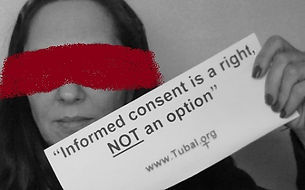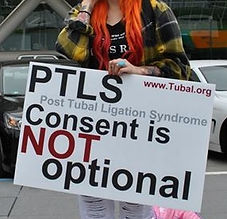Welcome to the CPTwomen, Tubal.org, your source for information about the side effects of female sterilization, salpingectomy, tubal ligation, Essure, and clips.
This site includes affiliate links to products & services. When you buy something we *suggest or mention we may earn a small commission at no extra cost to you. We thank you.

The Issue
Female sterilization is defined as any medical procedure or treatment done to affect the fallopian tubes to render a woman permanently unable to become pregnant. Female sterilization is the most commonly used method of birth control/family planning utilized by couples in the United States. While female sterilization is considered to be an elective medical procedure, it is sold and marketed as a consumer product to women in the U.S. just as other forms of birth control methods are sold and marketed (condoms, IUDs, the pill, etc…). For this reason consumer protection is needed as well as informed consent.
Female sterilization can cause negative iatrogenic side effects known by the OBGYN medical community as post tubal ligation syndrome (PTLS) or post sterilization syndrome. These side effects can be physical or hormonal in nature and include bleeding, hydrosalpinx, pain and loss of ovarian function. When a medical device is used such as filshie clips or Essure, there is added risk the medical device(s) can migrate and/or cause severe inflammatory/allergic reactions to the silicone, pet fibers, and nickel which is found in these devices. Physical and hormonal health changes can cause mental health to be affected causing loss of libido, memory loss, depression, anger and rage.
Physicians are required by law to inform and advise patients about the consequences and risks of medical procedures. For elective surgery this means even remote risk (statistics are irrelevant). All forms of birth control list and disclose both risks and benefits of each expect for sterilization. Post Sterilization Syndrome is known and understood by the OBGYN medical community but in a widespread systematic way this information is routinely withheld from women at the time of consent. Withholding information creates a cycle of abuse surrounding female sterilization.
Lack adequate disclosure and withholding medical information is a deceptive practice done to sell the elective procedure/surgery/treatment/device and to persuade/compel women to make the decision that the doctor wants them to make. In doing so the physician and others benefit and profit. The act of withholding information is an attack directed against women, disables her decision process, distorts her choice, puts her at a disadvantage, and creates for her a disability. The mere fact that the woman might refuse treatment is not sufficient to act as a justification for nondisclosure of information, limited disclosure, or therapeutic privilege.
Key Issues:
-
Policy - Obtaining valid consent before carrying out medical, therapeutic and diagnostic procedures has long been recognized as an elementary step in fulfilling the doctor's obligations to the patient.
-
Ethics - Withholding information from patients is ethically unacceptable. The notion of consent is grounded in the ethical principles of patient autonomy and respect for persons. "Autonomy" refers to the patient's right to make free decisions about his or her health care. Respect for persons requires that health care professionals refrain from carrying out unwanted interventions and that they foster patients' control over their own lives.
-
Law: Negligence - It is the treating physicians legal requirement to present all risks and benefits and obtain the patient's informed consent before providing treatment. Treating a patient on the basis of inadequately informed consent constitutes negligence. If the patient has been lied to about the treatment or there is other fraud in the informed consent, then the entire consent is invalid.
-
Law: Battery - Treating a patient without her full informed consent (or with invalid consent) constitutes battery. Battery is committed even if the doctor acts in the patient’s best interest.
Female sterilization in all cases is directed to be an elective choice to be decided by the woman alone at her own free will after information is presented detailing all known benefits and possible risks and while not in duress or distress.
Coercive sterilization is a grave human rights violation that is frequently targeted at women from marginalized segments of society. Coercive sterilization often occurs while a woman is giving birth or soon after, when she is in a position of powerlessness at the hands of healthcare providers.
Consent cannot be obtained from a woman who is
-
in an altered state of consciousness
-
in any stage of labor or postpartum euphoria
-
while in a state of extreme fatigue or sleep deprived
-
on mind- or emotion-altering drugs
Withholding information about known possible side effects and/or obtaining consent while a woman is in labor, while a woman is on opiate pain medication (or in an altered state of consciousness), or when a woman is under undue duress or distress all constitutes forced (fraudulent/coerced) consent and in all accounts (figuratively and legally) is battery (committed by the person who performs the sterilization).
Until law is created to protect women that ensures all the known and possible risks of female sterilization is disclosed at the time of consent, all women who are sterilized are (and will be) a victim of battery.
We ask for help and support from all organizations who advocate for women’s health rights and petition all lawmakers to, sponsor, co-sponsor, endorse and support all bills at the state and national level which would require full disclosure (informed consent) and protection for consumers of female sterilization.
All parties shall take the necessary legislative or other measures to ensure that the intentional conduct of withholding information about negative side effects to female sterilization and consumer fraud surrounding female sterilization is criminalized.

